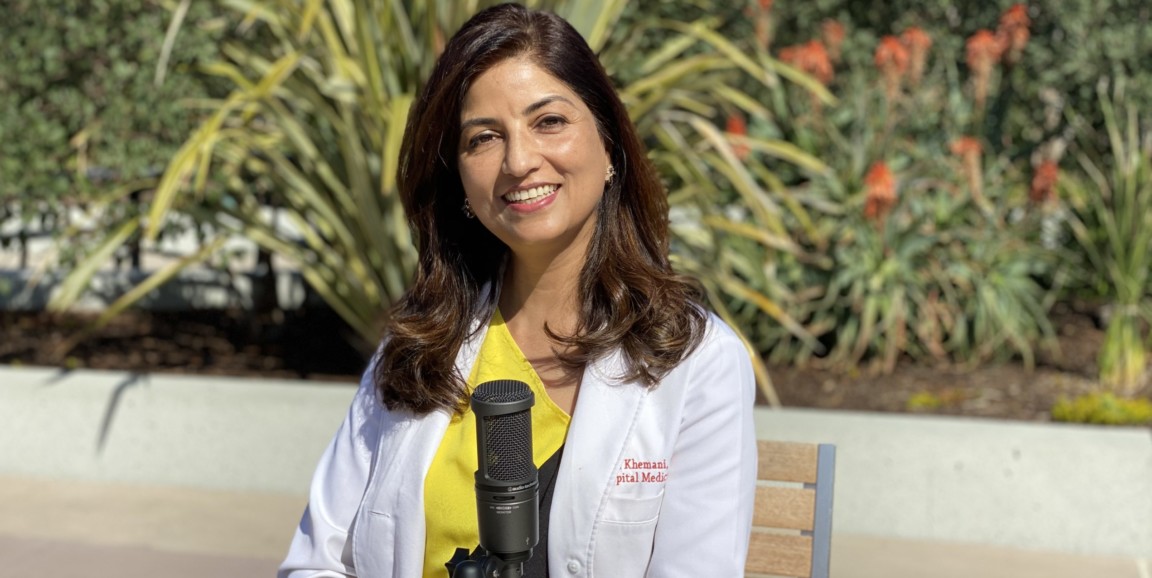Many promising students have doubts about their ability to get into medical school or questions about applying. To demystify this process and share the challenges and success stories of current doctors, residents and medical students, Stanford hospitalist Sarita Khemani, MD, started the podcast "Journey to Medicine."
I spoke with her about the inspiration for the podcast, and where she plans to take the show in the future.
What inspired you to start this podcast?
My colleague Eva Weinlander, MD, and I, about five years ago, decided to start a program called the Stanford Medicine Clinical Summer Internship. It's a two-week session for upper-level high school and undergraduate students who want to learn more about the field of medicine.
The participants interview and examine patients, and do simulation medical activities like childbirth, trauma, ultrasounds, injections, suturing and diabetes management -- so it's quite broad.
The students loved when our residents, medical students and faculty came and gave talks. The students had a lot of questions about what motivated them to apply to medical school and what they did to get in. As the summer program has limited spots, the idea of a podcast came up. Through this medium, it would be possible to reach and help a much larger group of students.
Are medical school applicants your target audience?
That's how it started. Interestingly, after I had published a few episodes, I found that teachers and parents are actually listening to it quite a bit. Parents -- especially those who are not in the field of medicine -- told me how it was so great to listen to this to understand why it is so hard and why it takes so long. And they told me, "Wow, it's really helped listening to people who have done this, and now I can really understand and support my kids more."
Also, a majority of the listeners are in the U.S., in almost every state, but I found there are listeners in close to 100 countries, including Indonesia, Myanmar and South Africa.
What is your story of applying to medical school?
I grew up in India, and I didn't think I was going into medicine. I was in performing arts, and I loved doing theater. But when I was in high school, I figured out that my performing career wasn't going to go anywhere. Then I said, "OK, I really like biology, let me try to grow in that area." So I did.
In India, it's a little different. You go to medical school after high school. And once I got in there, I felt like that was the right place.
It sounds like the podcast gives you an outlet for your theatrical interests. What do you find most enjoyable about it?
When I start interviewing someone -- one of my colleagues, students or residents that I work with -- I get really interested in knowing their story because it's fascinating. I sometimes even forget that I'm actually doing the podcast.
And then I really enjoy when people listen and they clearly got something out of it. That's also nice to hear.
What's one of your favorite episodes?
It's my interview with medical student Nada Marie Rizk. She talks about how she always wanted to be a doctor, but the medical school application process left her frustrated and questioning her decision -- and what helped her get through that period.
What are your future plans for the podcast?
I want to broaden it to different specialties and different fields in health care, like physician assistants and nursing professions. I think that it will be nice to give a really broad perspective.
Are you a fan of podcasts in general? Do you have any recommendations?
When I started looking into creating a podcast, I actually started listening to them; and now yes, I am a big fan. I listen to podcasts all the time when I'm driving, cooking and walking my dogs. I really think it's a great medium because I've learned so much about so many different things.
In medicine, I listen to the "The Curbsiders," which is mainly for physicians, and "The Drive," which is for everyone. And then the other one that I really like is a series called Making; "Making Obama," "Making Oprah" and "Making Beyoncé." The podcasts follow their life stories, and that is fascinating to me.
"Journey to Medicine" is available on Apple Podcasts and all other major platforms.
Photo by Daphne Sashin




